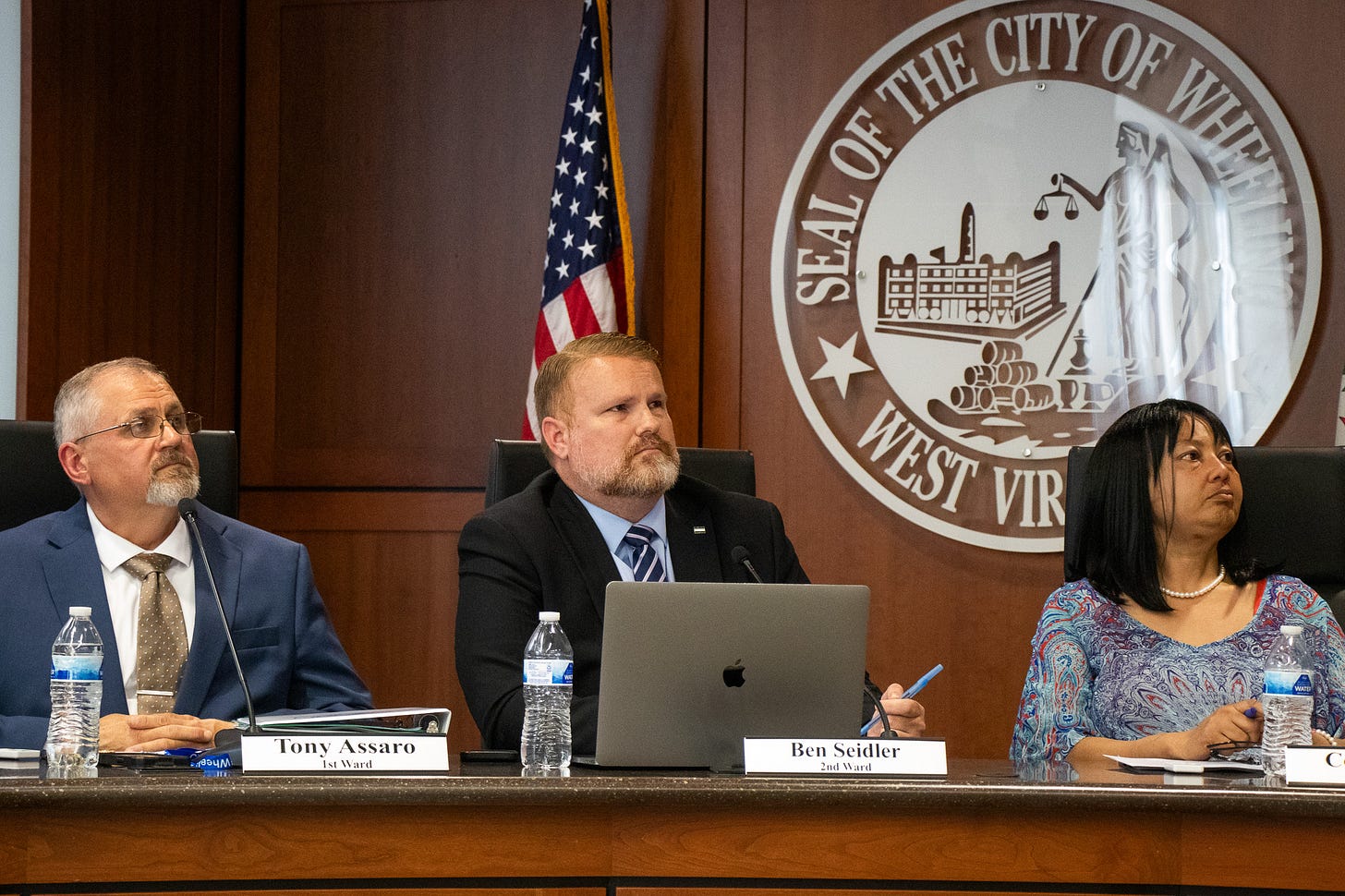Seidler takes aim at nonprofits; says he may call for homeless camp closure
Councilor Ben Seidler says he’s “disgruntled” by the exempted camp for homeless residents and that nonprofits need to “step up” and “police” the site.
WHEELING – Councilor Ben Seidler said during remarks at the Tuesday, March 4 city council meeting that he is “disgruntled” with how an exempted camp for homeless people is being run. He said he may call for the camp’s closure if the issues he alleges are not addressed.
The area in question sits below the Interstate 70 overpass at Exit 1B along Wheeling Creek.
Homeless residents have set up camp here since November 2024 when city leaders moved the location from a prior exempted camp one thousand feet southeast. It is the only area in the city where homeless people are permitted to sleep, set up camp, store personal belongings or cook food on public property after the city’s sleeping ban went into effect in January of last year.
“We started this homeless camp as an exempted property…as a triage for homeless individuals while they find the services that they [need],” Seidler said. “The intent was that the nonprofit agencies in the city that help our homeless individuals would be able to go to one central location and really give them resources and help them through the process of getting on the right track to end their cycle of homelessness.”
It’s not clear whether a memorandum of understanding exists between the city and nonprofit groups governing the exempted camp.
“I’m a little bit disgruntled,” Seidler said. He recalled a recent trip to the site where he saw trash strewn throughout the camp and “all over the creek,” saying it was a shame “when [the city is] providing dumpsters [to the camp].”
While some trash at the site is from the area’s homeless residents, not all blame can be placed at their feet. The city of Wheeling has, until recently, operated a dump site just feet from the camp where city vehicles have transferred trash from smaller vehicles into large roll-off dumpsters.
In a response to a Freedom of Information Act requisition submitted to the state’s Department of Environmental Protection, internal communication from the DEP regarding Wheeling’s dump site states the city’s “control of wind blown [debris]” was “questionable,” and that the “suspected leachate below the roll offs [sp]” were in violation of state code.
The city of Wheeling saw a formal complaint levied against them in August 2024 claiming they were operating an “open dump” where trash sits on the ground for “sometimes minutes, sometimes hours, sometimes days” until heavy equipment removes it.
WFP sources say the site has been cleaned up and dumpsters removed in recent days. It’s uncertain the extent of wind-blown waste caused by the city’s unregulated dump site.
“We had a unanimous–except for one person–agreement that the nonprofit agencies in the city would manage that camp…keep the camp clean, police the camp…in terms of just camp rules and make this thing decent,” Seidler said. “That’s not what’s happening. This place is ripe for drugs, abuse, human trafficking and the list goes on.”
Seidler said nonprofits needed to “step up and get it together” or he would call for the camp’s closure.
“I don’t have a whole lot of length left in my buffer for this camp at this point,” Seidler said.
It’s not the first time Seidler has taken aim at service providers assisting the city’s homeless population.
In August 2024, Seidler spoke with WAJR: The Voice of Morgantown as that city considered its own sleeping ban. “A lot of these other providers are activists with a lack of character and integrity who repeatedly speak false and half-truths to create a never-ending victim mentality and paint a completely false narrative about what’s going on here,” Seidler told WAJR about Wheeling’s exempted camp.
Local nonprofit Street MOMs, who regularly services the camp, rebuffed Seidler’s comments Tuesday.
“We do far more than what is required by volunteers,” Susan Brossman, co-founder, told Wheeling Free Press. “We provide tents, tarps, blankets, sleeping bags, hand warmers, clothing, shoes, food, water, hygiene products, rides to appointments and just about anything [the homeless] need to survive.” Brossman went on to say that the organization provides all clothing, hats, gloves and socks for the Life Hub, a low-barrier winter freeze shelter in the city.
Seidler’s comments come as the state’s House of Delegates considers House Bill 2382 which would outlaw sleeping, setting up campsites, storing personal belongings or cooking on public property statewide. The measure largely targets homeless people.
HB 2382 has seen action in the chamber’s Judiciary Committee. If signed into law, the bill would see fines up to $500 or a 30 day jail sentence. A similar bill in the Senate, SB 134, includes a provision to offer those violating the law “one way bus ticket, at no cost, to…Atlanta, Denver, Detroit, Chicago, New York, or the District of Columbia.”
The city of Wheeling is one of six West Virginia municipalities with a sleeping ban.


